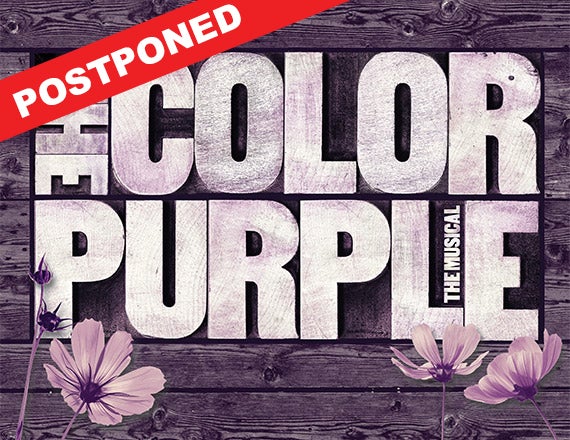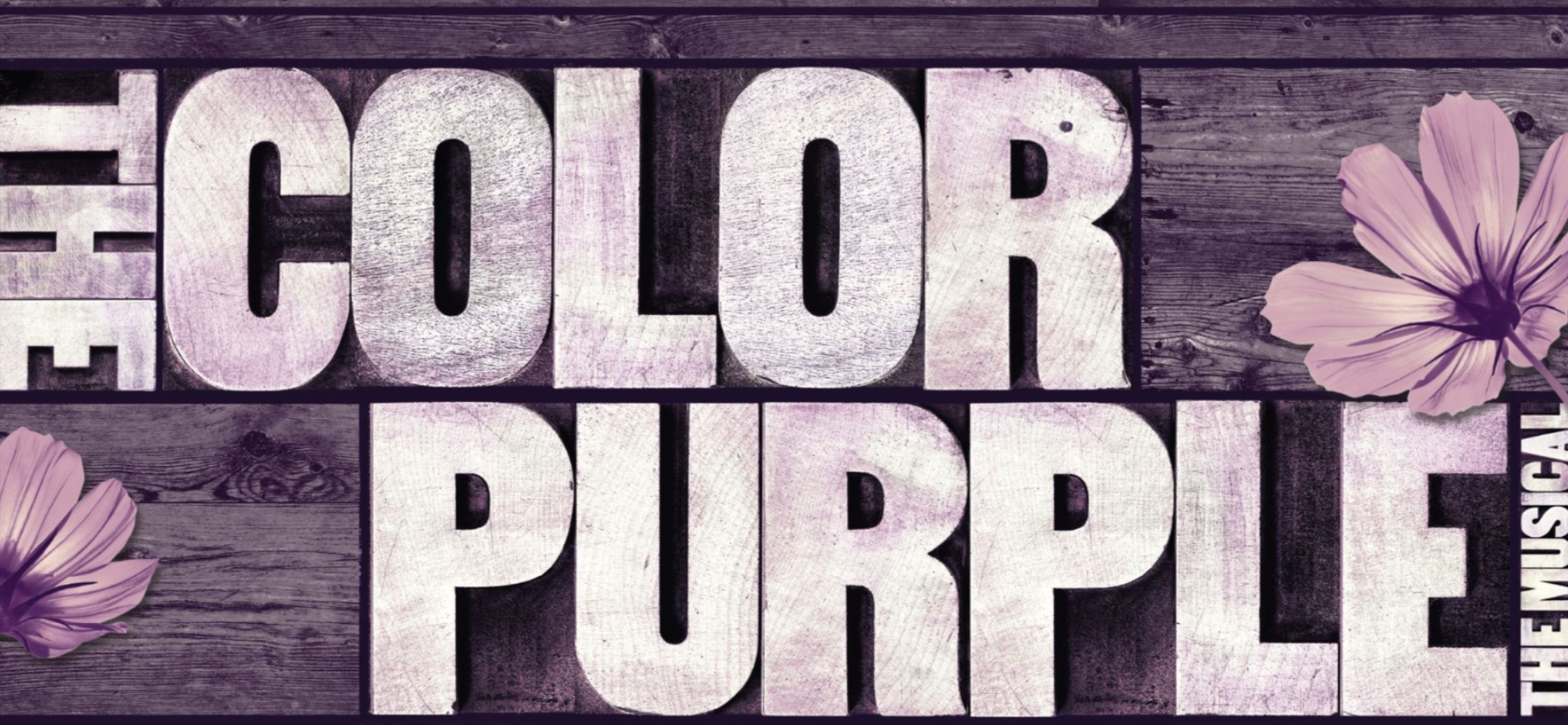
Why It’s Time to Revisit (or Discover) THE COLOR PURPLE: Three Charlotteans Weigh-In
It all started with a book. In 1983, Alice Walker’s novel, “The Color Purple,” won the Pulitzer Prize for Fiction and the National Book Award. Then there was the 1985 Steven Spielberg movie, nominated for 11 Academy Awards, and featuring stars like Whoopi Goldberg, Oprah Winfrey, and Danny Glover.
The Broadway musical opened in 2005, recouping the producers’ initial $11 million investment within one year (something many shows never manage to do). And less than 10 years later, a celebrated London version was so good, producers brought it back to Broadway, where it won two Tony Awards, including Best Revival of a Musical.
We talked to three local women about what makes THE COLOR PURPLE stand out and why you won’t want to miss it when it returns to Charlotte, March 23 - 26.
THE STORY
“Have YOU seen THE COLOR PURPLE?” That’s a question Michelle Lee has often posed to others since she first discovered the musical years ago. She has made it part of her personal mission to introduce friends, family members, and co-workers to this award-winning show. An executive at Wells Fargo and a Blumenthal Performing Arts Trustee, Lee has seen the Broadway musical in New York or on tour more than 20 times!
While she’s had an extraordinary business career (in her current role, she oversees more than 3,300 banking branches and approximately 34,000 team members), her first love was actually musical theater and opera, which she discovered via the small screen, as a child in Newark, NJ.
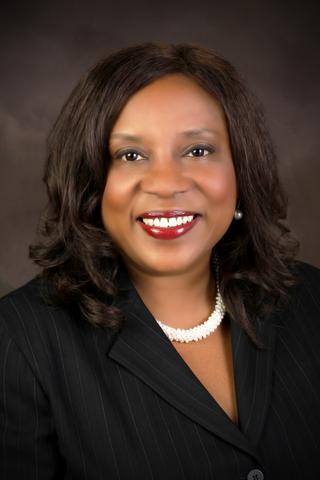
(Michelle Lee)
“I was obsessed with any kind of musical. Whether it was PORGY AND BESS or CHITTY CHITTY BANG BANG, I was glued to the TV.” Later, she attended a performing arts high school and went on to study opera at the prestigious Boston Conservatory of Music.
All this to say, she knows a good show when she sees one.
At first, Lee didn’t know what to expect. She had loved the book and the movie but wondered how the story of Celie—a poor black woman living in rural Georgia in the early 1900s, through a life marked by heartache, loss and abuse—could be transformed into a musical. “I’m thinking this is going to be the saddest thing ever so that was the first surprise,” says Lee.
While the musical certainly has its tragic moments, Lee says it balances that drama with humor and a wonderful musical score. Celie eventually finds love in an unexpected place, and it gives her the strength to stand up for herself, to rise above her circumstances, and take control of her life. All of this is ultimately uplifting. “I was blown away by that,” says Lee.
“It’s a great story and this is an incredible work of Alice Walker and that forms this foundation, and the music just enhances and makes it better… I haven’t been to a show where the entire audience wasn’t on its feet at the end.”
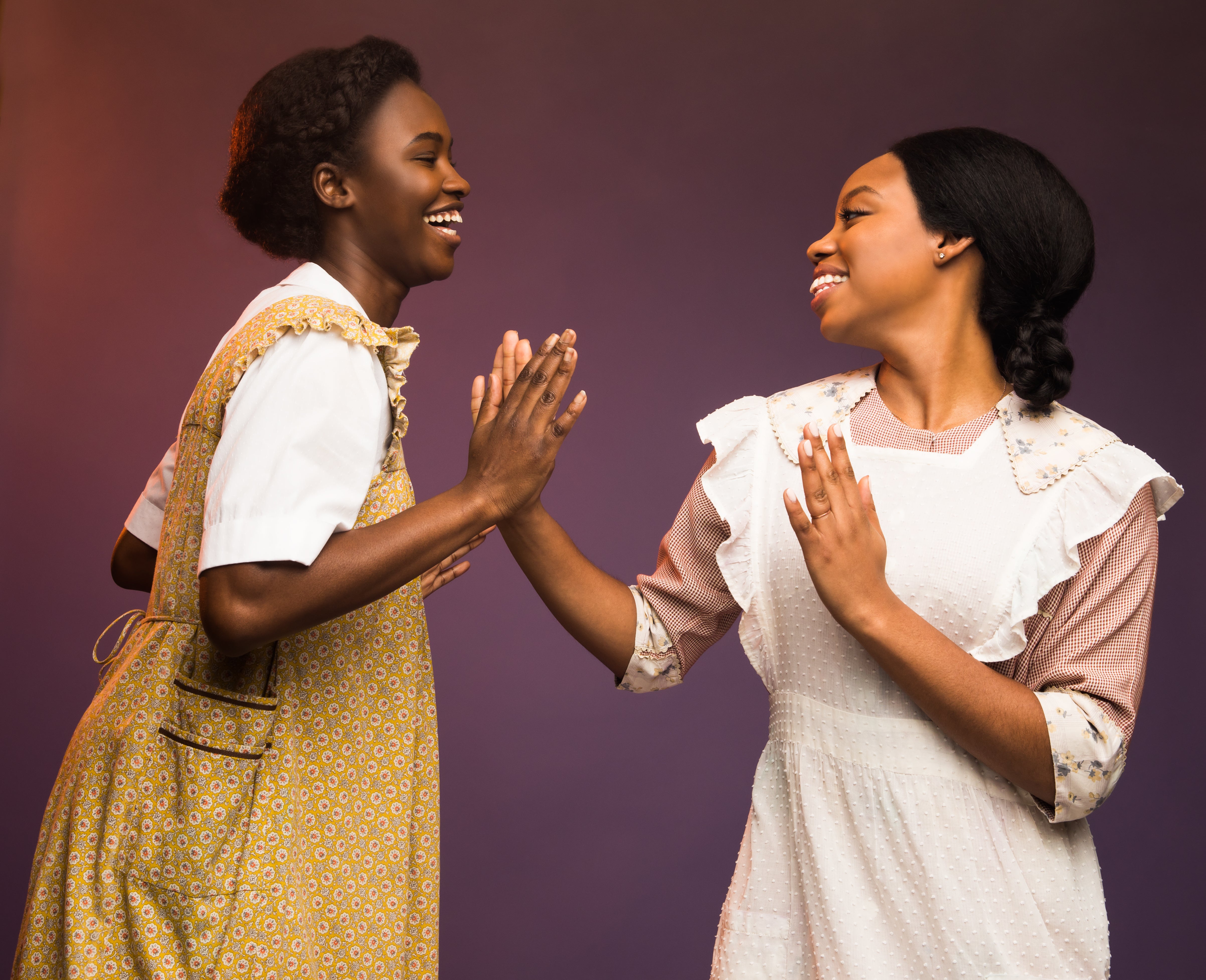
Lee says the many times she watched the show in New York, she noted the diverse audiences, in which there were “probably just as many people of color as caucasians. [It’s] not like the black folks are standing up and the caucasians are sitting—everybody’s in… you almost feel like someone has opened a vein and bared their soul to you. I don’t think you have to be a musician or someone who studied the arts to appreciate it, you just have to be human. Because this story is about the resiliency of the human spirit, the flaws of the human spirit and the ability to rise above obstacles and personal shortcomings.”
For Felicia Robinson, a House Manager at Blumenthal Performing Arts, THE COLOR PURPLE is rooted in tragic circumstances but also in finding love and acceptance. While it confronts difficult issues, it also is a story very much about women’s empowerment. “It’s a story [that] touches on a lot of life situations that people can identify with… and have empathy for,” says Robinson, who is also a performer, known particularly for her gospel singing.
Kaja Dunn, assistant professor of acting at UNC-Charlotte, says Alice Walker was ahead of her time when she wrote the book: she captured the imagination by putting black women at the center of a story of their own, emphasizing their self determination, ability to survive, connect and heal in spite of dealing with horrific trauma.
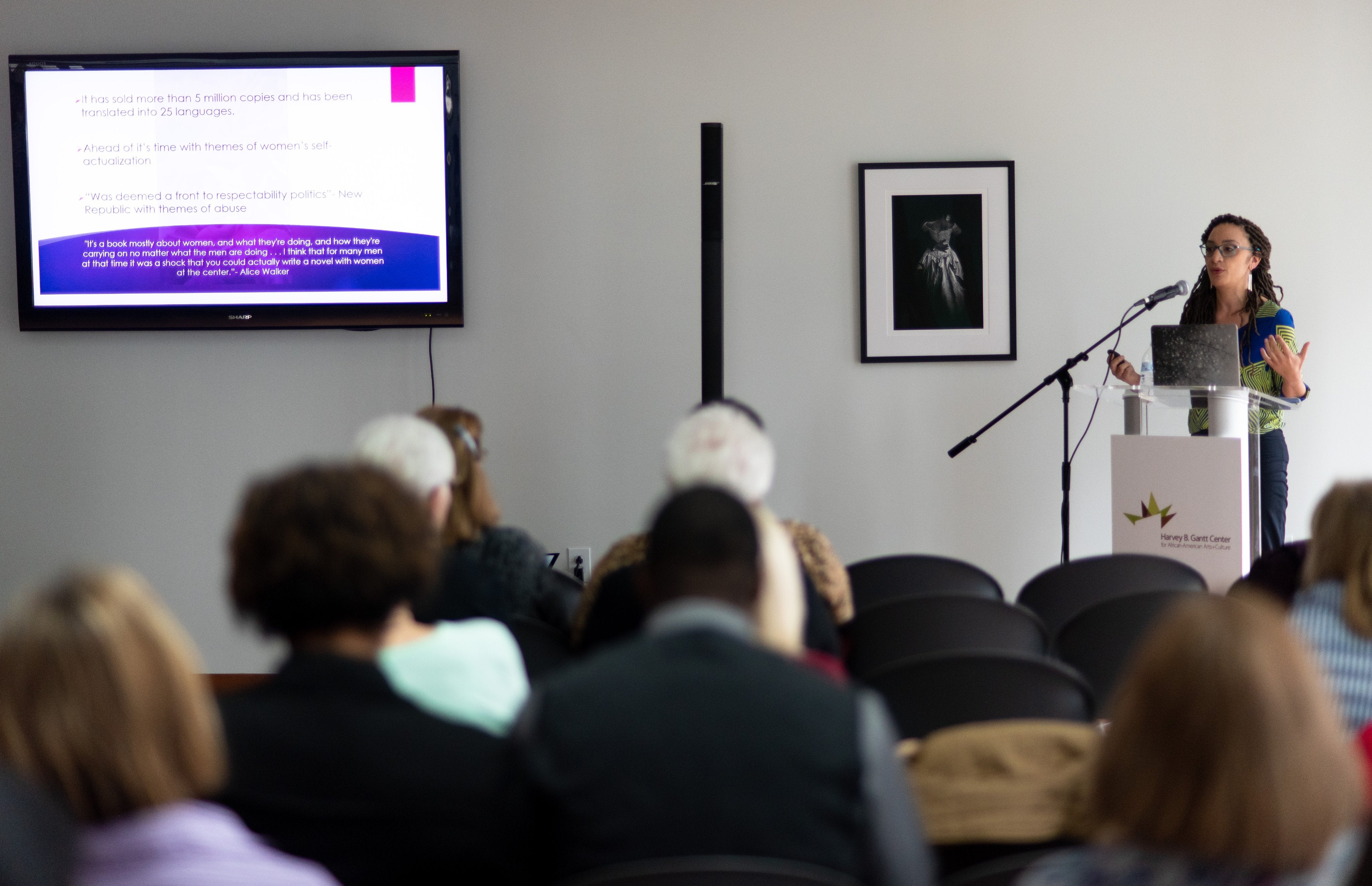
(Kaja Dunn leading Blumenthal's "Get To Know The Show" program at the Harvey B. Gantt Center, featuring THE COLOR PURPLE)
Beyond the powerful story, all three say the music is a key to the show’s success.
A BEAUTIFUL SCORE
“The music, it’s just beautiful,” says Lee. “It finds the balance between music theater, a little R & B feel, a little churchy feel… The music is what stays with you a week later, two weeks or, for me, 20 years later. That’s what helps you connect. Music is the ultimate connector of people across difference.”
Robinson knows the movie so well, she says it took her a little time to get used to the Broadway musical. “When I first heard the music, I was surprised just because it was so completely different from the movie,” she says, “but after seeing it and seeing the songs incorporated in the show, these songs fit the show.” It’s hard to compare the two, she says, but each score is solid.
Dunn says music plays a unique role in the African-American tradition: “African Americans have a long history of storytelling through our songs. So if you listen to the songs we carry as a culture, you know songs were used to send codes to people, songs were used to express pain and tribulation in a way that wouldn’t get us punished on plantations. Songs have also been used to celebrate our triumphs. And all of our movements involved singing, our gatherings involved music and singing and they have for centuries. You can’t think about the freedom movement or the civil rights movement [without them] and I don’t just mean African Americans…I think wherever in the diaspora you go we have a spiritual connection to our music and I think there’s some of that that’s applicable to THE COLOR PURPLE.”
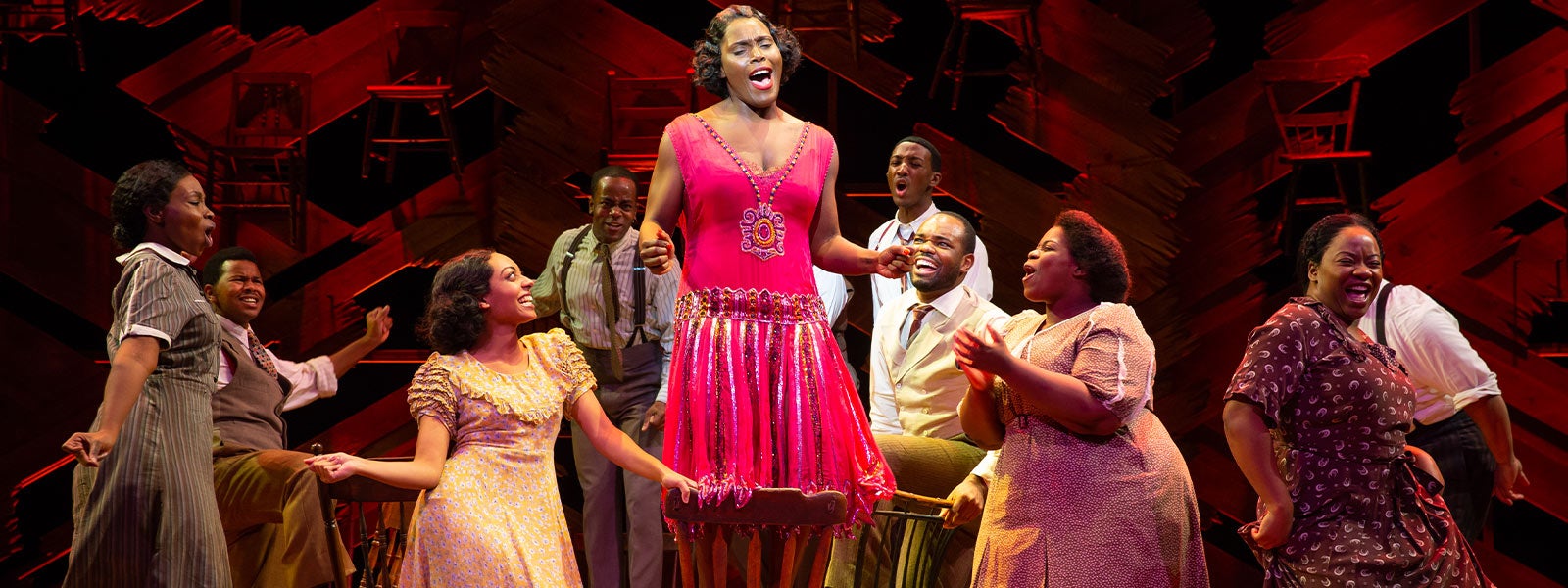
INCREDIBLE PERFORMANCES
One of the things Lee likes best about having seen so many productions of THE COLOR PURPLE is the way each cast brings something different to it. Over the years, she has watched an incredible array of performers, including Jennifer Hudson, Fantasia, Cynthia Erivo, and Chaka Khan. Seeing how the characters are interpreted gives her a new reason to go each time.
She says THE COLOR PURPLE has really emerged as a classic in her culture and anytime it’s coming through town, she is going to see it. “Just like THE MARRIAGE OF FIGARO and LA BOHEME… I see something that I haven't seen before and hear something that I haven’t heard before.”
Dunn adds other remarkable performers to that list of THE COLOR PURPLE alumni, like Krisha Marcano (now an assistant dean at North Carolina School of the Arts), Heather Headley (who originated the role of Nala in Broadway’s THE LION KING), and Renée Elise Goldsberry (who originated the role of Angelica Schuyler in HAMILTON).
An actor and director herself, Dunn’s academic research focuses on Equity, Diversity and Inclusion in theater. She says she is really excited to watch this version of this show with young actors since she sees such a broad spectrum of talent coming up through schools and theaters around the country. She hopes that the success of a show like THE COLOR PURPLE helps open the door to more shows with diverse stories, casts, and production teams.
“I think there’s a deep power in having a multiplicity of voices,” says Dunn.
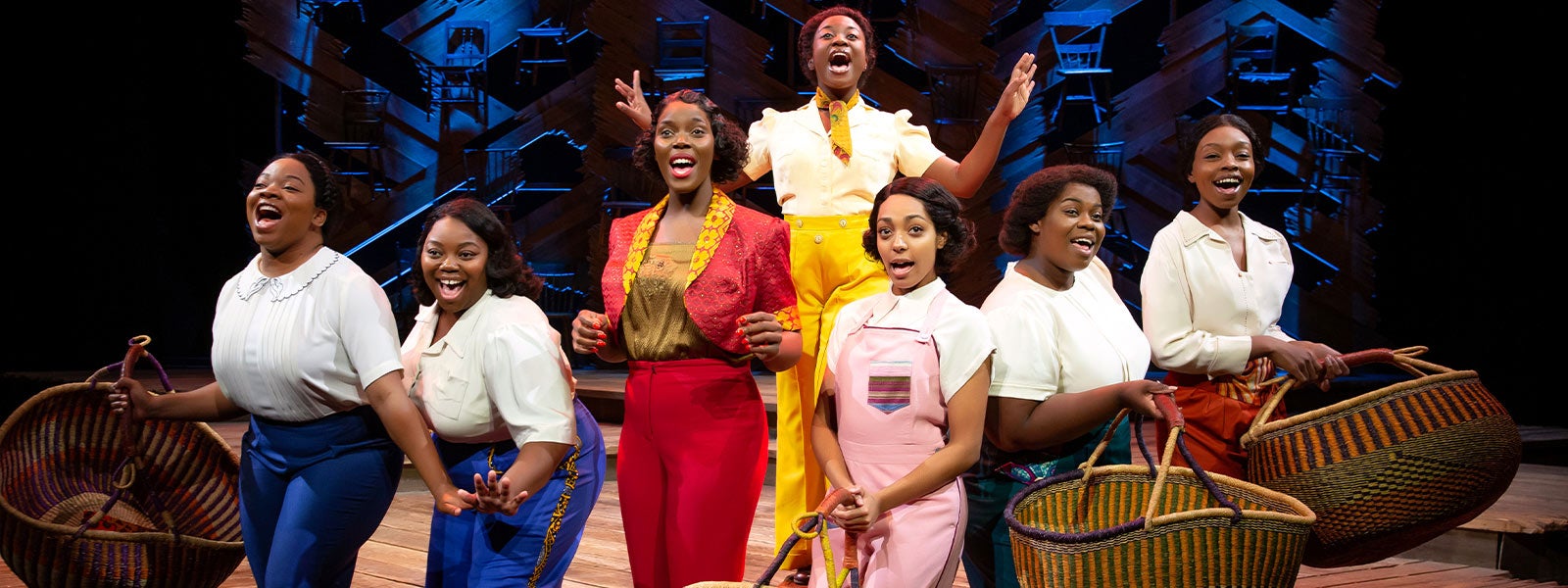
It’s also good, she says, for people who may initially think, “this show’s not for me,” to see productions telling stories about and featuring people of color and others who have been historically excluded.
“For the longest time, people of color have found themselves in stories that were centered around whiteness. And I think it is good for people who are in dominant theater culture to go and see and hear stories that aren’t centered around them… One, they’re fantastic stories… but also that’s how you learn and how you grow. We keep talking about finding common ground but until you see multiple stories from different points of view who are different from you, we can’t enter into meaningful conversation.”
